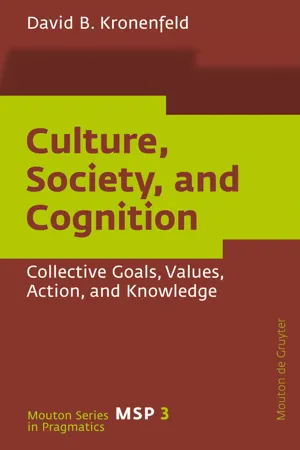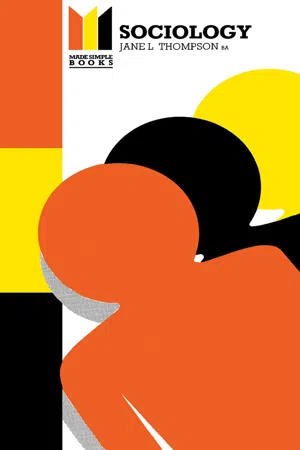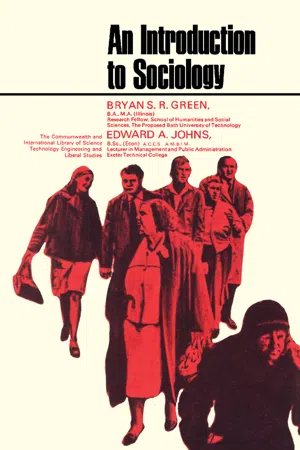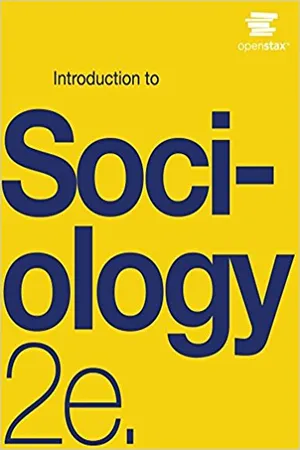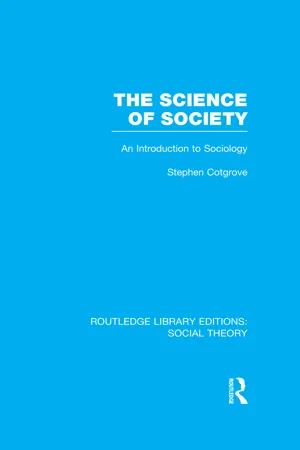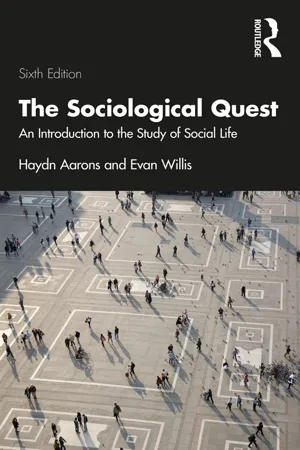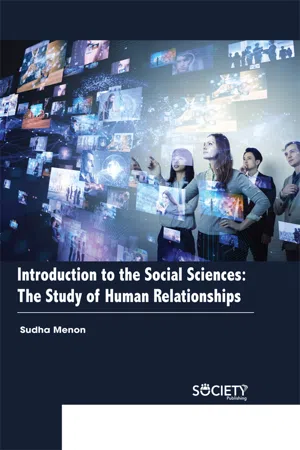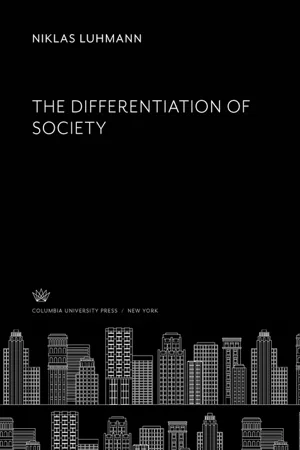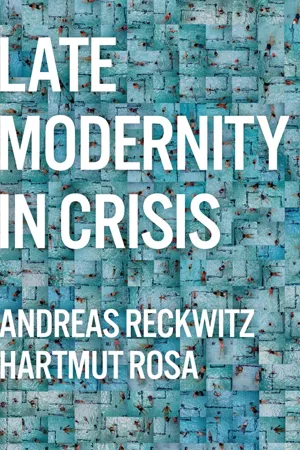Social Sciences
What is Society?
Society refers to a group of individuals who share a common culture, norms, and values, and interact with one another within a specific geographical area. It encompasses various social institutions, such as family, education, and government, and plays a crucial role in shaping individuals' behaviors, beliefs, and identities. The study of society involves examining social relationships, structures, and processes to understand human behavior and societal dynamics.
Written by Perlego with AI-assistance
Related key terms
1 of 5
11 Key excerpts on "What is Society?"
- eBook - PDF
Sociology
The Essentials
- Margaret L. Andersen; Howard F. Taylor, Margaret Andersen, Howard Taylor(Authors)
- 2016(Publication Date)
- Cengage Learning EMEA(Publisher)
104 CHAPTER 5 What is Society?? In Chapter 2, we studied culture as one force that holds society together. Culture is the general way of life, including norms, customs, beliefs, and language. Human society is a system of social interaction , typi-cally within geographical boundaries, that includes both culture and social organization. Within a society, members have a common culture, even though there may also be great diversity within it. Members of a soci-ety think of themselves as distinct from other societ-ies, maintain ties of social interaction, and have a high degree of interdependence. The interaction they have, whether based on harmony or conflict, is one element of society. Within society, social interaction is behavior between two or more people that is given meaning by them. Social interaction is how people relate to each other and form social bonds. Social interaction is the foundation of society, but society is more than a collection of individual social actions. Emile Durkheim, the classical sociological the-orist, described society as sui generis —a Latin phrase meaning “a thing in itself, of its own particular kind.” To sociologists, seeing society sui generis means that society is more than just the sum of its parts. Durkheim saw society as an organism, something comprising different parts that work together to create a unique whole. Just as a human body is not just a collection of organs but is alive as a whole organism with relation-ships between its organs, society is not only a simple collection of individuals, groups, or institutions but is a whole entity that consists of all these elements and their interrelationships. This central sociological idea, that society is much more than the sum of individuals, means that society takes on a life of its own. It is patterned by humans and their interactions, but it is something that endures and takes on shape and structure beyond the immediacy of any given group of people. - eBook - PDF
Sociology
The Essentials
- Margaret Andersen, Margaret Andersen, Howard Taylor(Authors)
- 2019(Publication Date)
- Cengage Learning EMEA(Publisher)
Due to electronic rights, some third party content may be suppressed from the eBook and/or eChapter(s). Editorial review has deemed that any suppressed content does not materially affect the overall learning experience. Cengage Learning reserves the right to remove additional content at any time if subsequent rights restrictions require it. CHAPTER 5 Social Structure and Social Interaction 105 These same students might put ear buds into their ears as they move on to their next class, possibly tuning in to the latest sounds while tuning out the sounds of the environment around them. Some will return to their residences and perhaps text message friends, download some music, or send a photo via Instagram. Surrounding all of this behavior are social changes that are taking place in society, including changes in technology, in global communication, and in how people now interact with each other. How we make sense of these changes requires an understanding of the connection between society and social interaction. In this way, a sociological perspective can help you see the relationship between individuals and the larger society in which people live. What is Society?? In Chapter 2, we studied culture as one force that holds society together. Culture is the general way of life in any society, including norms, customs, beliefs, and language. Human society is a system of social interaction, typically within geographical boundaries, that includes both culture and social organization. Within a society, members have a common culture, even though there may also be great diversity within it. Members of a society think of themselves as distinct from other societies, maintain ties of social inter- action, and have a high degree of interdependence. The interaction they have, whether based on harmony or conflict, is one element of society. Within society, social interaction is behavior between two or more people that is given meaning by them. - eBook - PDF
Culture, Society, and Cognition
Collective Goals, Values, Action, and Knowledge
- David B. Kronenfeld(Author)
- 2008(Publication Date)
- De Gruyter Mouton(Publisher)
Chapter 6 Society (with a note on the self) 1. Society: issues Our discussion of the various social groups to which ethnic and other group labels are applied and to which the people applying the group labels belong takes us to question of what is the nature of such social groups and through them of society. Society has often been understood to be an emergent phe-nomenon, a kind of super-individual and superorganic entity that shapes and constrains the behavior of its members. Society in the large is consid-ered, in this context, to be made up of a collection of smaller social groups in part hierarchically interlinked, in part networked to one another, and in part independent (though possibly linked by overlapping membership). So-ciety thus understood can be taken as a kind of structure – as it was by Radcliffe-Brown and Fortes. The problem with the idea of society as a “thing” is that the more that one tries to precisely define – or focus on – it or its parts the more it seems to dissolve into fuzzier patterns of interaction among individual persons. And the related problem with the structure idea, as so richly if inadvertently illustrated by Fortes’ Tallensi books, is that the interactions that are supposed to instantiate and exemplify the structure seem too inconsistent and variable. These considerations take us to Fredrik Barth’s conception of society (1992) as cumulated patterns of individual interactions, shaped and aligned through feedback with the environment (including other individuals) – where consistencies in the environment induce consistencies across the be-havior of individuals. Barth contrasts his view, in which “society” itself can be considered an epiphenomenal appearance produced by recurring patterns of individual behavior produced for individual reasons, with the view which he rejects, in which society is seen as some actual entity with clearly delineated boundaries and some clear systemic properties and interactions. - eBook - PDF
Sociology
Made Simple
- Jane L. Thompson(Author)
- 2013(Publication Date)
- Made Simple(Publisher)
Sociology and the Social Sciences Sociology is about social behaviour, why people behave as they do, what factors in society affect their behaviour, how groups of people in society organise themselves and come tg be as they are. Of course, an interest in 'people' could be claimed by almost every academic dis-cipUne in one way or another. Even nuclear scientists cannot fail to take account of the behaviour and expectations of the people in the society in which they work. But sociology is about more than an 'awareness o f or 'an interest' in people. It is an attempt to study, in as scientific and systematic a way as possible, how societies operate. This means trying to 'stand back' from society a little—watching, re-cording, measuring, evaluating and interpreting what is going on, and 1 2 Sociology trying to explain how and why so many of the things we all take for granted about society come to be as they are. Of course, societies are made up of countless individuals, all differ-ent from each other in many respects. The idiosyncracies of individual behaviour, which in part cause different people to think and react differently, are of interest to sociologists, but are probably more the concern of psychologists. Both disciplines are closely related, but whereas the psychologist tends to start from the individual, the socio-logist usually concentrates on the social group he or she belongs to. Sociologists look more for similarities and patterns that can be detected in the behaviour of numbers of individuals who maybe share the same environment or social class or nationality. They try to make accurate generalisations about the characteristics of human behaviour and social organisation, to identify what causes them and to suggest what their implications might be. It is probably this kind of concern that has in the minds of many laymen earned the sociologist the re-putation of being 'nosey'. - eBook - PDF
- Bryan S. R. Green, Edward A. Johns(Authors)
- 2013(Publication Date)
- Pergamon(Publisher)
The clearest examples occur in studies of formal organizations where positions are officially defined for administrative purposes. The smallest type of social system consists of two actors and is called a dyad. Real life units such as the family, the club, the neighbourhood and so on may be analysed as social systems, though varying in size, type of interaction and activities engaged in. The largest and most comprehensive type of social system studied by sociologists is called a society. We have organized our discussion of concepts in terms of the three directions which the search for social regularities may take: (a) cultural elements; (b) the individual as social actor; (c) units of social interaction. 40 AN INTRODUCTION TO SOCIOLOGY CULTURAL ELEMENTS Culture was developed as a social scientific concept by anthro-pologists in the nineteenth century. Their primary concern was to distinguish social heredity, i.e. the passing down of culture from one generation to another, from biological heredity; to distinguish men from other animals. They used culture in an all-embracing way to include every aspect of social behaviour which could be thought of as distinctively human. According to Edward Tylor, the English anthropologist, culture is that complex whole which includes knowledge, belief, art, morals, law, custom and any other capabilities and habits acquired by man as a member of society. 1 A more recent definition by the American anthropologist, Kroeber, echoes this omnibus definition of culture as that which the human species has and other social species lack . .. speech, knowledge, beliefs, customs, arts and technologies, ideas and rules .. . what we learn from other men, from our elders and the past, plus what we may add to it. 2 The development of social science during the 1950's and 1960's has seen persistent efforts to narrow the concept for analytical purposes. One of the outstanding efforts was made by Kroeber and Talcott Parsons. - eBook - PDF
- Heather Griffiths, Nathan Keirns, Eric Strayer, Susan Cody-Rydzewski, Gail Scaramuzzo, Tommy Sadler, Sally Vyain, Jeff Bry, Faye Jones(Authors)
- 2015(Publication Date)
- Openstax(Publisher)
Why do we feel and act differently in different types of social situations? Why might people of a single group exhibit different behaviors in the same situation? Why might people acting similarly not feel connected to others exhibiting the same behavior? These are some of the many questions sociologists ask as they study people and societies. 1.1 What Is Sociology? Figure 1.2 Sociologists learn about society as a whole while studying one-to-one and group interactions. (Photo courtesy of Gareth Williams/flickr) What Are Society and Culture? Sociology is the study of groups and group interactions, societies and social interactions, from small and personal groups to very large groups. A group of people who live in a defined geographic area, who interact with one another, and who share a common culture is what sociologists call a society. Sociologists study all aspects and levels of society. Sociologists working from the micro-level study small groups and individual interactions, while those using macro-level analysis look at trends among and between large groups and societies. For example, a micro-level study might look at the accepted rules of conversation in various groups such as among teenagers or business professionals. In contrast, a macro-level analysis might research the ways that language use has changed over time or in social media outlets. The term culture refers to the group’s shared practices, values, and beliefs. Culture encompasses a group’s way of life, from routine, everyday interactions to the most important parts of group members' lives. It includes everything produced by a society, including all of the social rules. Sociologists often study culture using the sociological imagination, which pioneer sociologist C. Wright Mills described as an awareness of the relationship between a person’s behavior and experience and the wider culture that shaped the person’s choices and perceptions. - eBook - ePub
The Science of Society (RLE Social Theory)
An Introduction to Sociology
- Stephen Frederick Cotgrove(Author)
- 2020(Publication Date)
- Routledge(Publisher)
Chapter 1THE SCIENCE OF SOCIETY 1
What is sociology? It’s not surprising that we are so often asked this question. Sociology is not a subject which is generally taught in schools. And until recently, it has not been widely studied in British universities, although there has been a very rapid expansion in the 1960s. Moreover, its complexities, plus its relative newness, mean that there are still considerable differences of opinion among people calling themselves sociologists as to precisely how the subject is to be approached.This chapter is one of a number of possible answers to the question. Whether it is the correct answer or not, only the future development of the subject will show. It outlines briefly the variety of answers to specific questions, while at the same time stressing some major perspectives among contemporary sociologists. It will attempt answers to three main questions. Firstly, what is the subject matter of sociology? Secondly, how is this subject matter approached? And thirdly, why do we study it—what is its justification?The answer to the first question can be deceptively simple. It is really no answer to say that sociology studies human society, because so do history, and anthropology. Nor is it enough to say that it studies human social behaviour, because so does social psychology. We really want to know what is its distinct perspective. What is the distinctive way in which sociology looks at man and society and their interactions? What is the distinctively sociological perspective on, for example, marriage and the family?SOCIOLOGICAL PERSPECTIVES
A marriage seems at first sight to be an intensely personal affair. Boy meets girl, they fall in love, marry, set up house together. After a few years she stops working and has a baby, followed by a second and possibly a third at intervals of about two years, while the husband continues to work. - eBook - ePub
The Sociological Quest
An Introduction to the Study of Social Life
- Haydn Aarons, Evan Willis(Authors)
- 2022(Publication Date)
- Routledge(Publisher)
As Peter Berger (1963 : 15) has argued, social work is a practice in society whereas Sociology is more of an attempt to understand society. Sociology is one of the disciplines (along with Psychology) in which aspiring social workers should receive training. But there is nothing inherent in the aim of understanding how the social world works that inevitably leads to a particular practice. This fact notwithstanding, as we explain in depth in Chapter 9, sociological knowledge and skills can be applied to great effect to a range of industries and professions. So, sociological explanation can be distinguished from other forms of explanation, both of a social scientific nature and of an unscientific nature. From the latter, differentiation is possible because sociological explanation depends on the use of empirical evidence. For other social sciences, while acknowledging the considerable overlap between the different disciplines, and, in some senses, the artificial nature of the distinctions anyway, the difference between sociological and other types of explanation is largely one of emphasis. S ocial structure Like all the social sciences, Sociology is concerned with the relationship between the individual and society. The uniqueness of the sociological, though, compared with other sorts of explanation, lies in the manner in which the understanding of social phenomena is sought in the organisation of society as a whole – usually referred to as the social structure of society. This concept is defined in terms of the patterns of relationships, which are both persistent and systematic, between the different parts of a society. The social structure is comprised of different social institutions that are regular, organised patterns of social behaviour, such as universities or hospitals. Social structure and social institutions, it is important to note, are not fixed, unchanging, monolithic entities resulting in a neat organisation of society - Sudha Menon(Author)
- 2020(Publication Date)
- Society Publishing(Publisher)
It is interesting to note how the same principles and attitudes have dominated the social sciences many decades later (Benton and Craib, 2010; Sherkat, 2012; Zetterberg, 2018). 1.3. THE STUDY OF SOCIAL RELATIONSHIPS Having understood human beings, social sciences go to the next step of understanding how human beings relate to each other (Benton and Craib, 2010). Indeed, this has been seen to be the foundation of social sciences. Human beings become more of themselves as they interact with each other (Winch, 2015). We do not know whether someone has a predisposition for violence until they are in a community when these traits are witnessed for the first time. The violence that is being studied may not be directed at human beings but other non-human targets, but we can then ascertain that this person generally has a tendency to exhibit violent tendencies. Our responses to that person will also depend on the impact on the other human beings that they interact with. For example, pinching someone on the arm is perceived very differently from beheading them. These two acts can form a pattern of violence, but society has deemed one to be infinitely more serious than the latter. The social interactionist are particularly interested in how we develop reality after interacting with each other (Benton and Craib, 2010; Fay, 1987; Trist et al., 2016). Two or more individuals start to develop a new reality when they relate to each other (Fay, 1987; Trist et al., 2016; Winch, 2015). That relationship can be dysfunction or mutually nurturing (Finlay and Agresti, 1986). All those subtle dynamics of the relationship including its place on the continuum from one extreme to another are of interest to social scientists (Winch, 2015). Figure 1.3 is an example of a social support network of relationships that can impact on the lives of young people. Introduction to the Social Sciences: The Study of Human Relationships 14 Figure 1.3.- eBook - PDF
- Niklas Luhmann, Stephen Holmes, Charles Larmore, Stephen Holmes, Charles Larmore(Authors)
- 2019(Publication Date)
- Columbia University Press(Publisher)
All contribu-tions are forced into sequential form. This takes time. Moreover, the linear form of a sequence can actually be disadvantageous for coordinating those communicated messages that have a highly com-plex subject matter. All in all, systems operating under such narrow structural constraints cannot attain a very high degree of complexity INTERACTION, ORGANIZATION, AND SOCIETY 73 either with regard to their own possibilities or in their relations to their environments. 2. There is no escaping these constraints on the level of simple face-to-face interaction. This can be accomplished only by ascend-ing to systems of another type, systems which can be detached not, indeed, from interaction itself but at least from the constraints on system formation operative at the level of face-to-face interaction. Such independence is achieved by social systems of the type society. Society can be classically defined as the all-embracing (and there-fore independent or autarchic) social system. It does not, however, necessarily include all actions that objectively exist, much less all human beings. A more precise definition is the following: society is the comprehensive system of all reciprocally accessible com-municative actions. Today, there is only one societal system—soci-ety is world society. Earlier, the situation was quite different. As a consequence, we need a concept which can denote both the overarching singleness and the irreducible multiplicity of societal systems. Society, first of all, is not merely the sum or aggregate of all personal interactions. Rather, it is a system of a higher order or of another type. Society, in fact, must also be capable of coordinating possible communication among or with those who, in any single case, are absent. Its regulative principle cuts clean across the bound-aries of interaction systems and makes itself independent of their parochial principles of boundary-formation and self-selection. - eBook - ePub
Late Modernity in Crisis
Why We Need a Theory of Society
- Andreas Reckwitz, Hartmut Rosa, Valentine A. Pakis(Authors)
- 2023(Publication Date)
- Polity(Publisher)
The nature of social phenomena is always in part conceptual; no social institution can be understood or practiced independent of the horizon of interpretation upon which it is based, and such horizons of meaning, in turn, cannot be understood in isolation, because they exist for their part in formational contexts. What is meant by these abstract concepts can be illustrated with a simple example. In order really to understand or explain what a person does when he or she goes to work in the morning, it is necessary to understand the modern system of paid labor, the concept of work–life balance, the separation of production and consumption, the distinction between politics and the economy, the notion of a career-driven life, the capitalist economy, and the defining features of (late-)modern subjectivity. Without such a horizon of interpretation, which allows us to recognize the contours of a social formation, it might be possible to describe this person’s practical activity and determine how it correlates with that of others, but it would be impossible to ascertain its social or cultural significance. Subjects thus always implicitly understand their own activity in light of its formation-related cultural significance, which lends meaning to this activity and to their existence. Because such self-interpretation always demands articulation, and because it is always contested, and thus always dynamic, the process of society’s self-interpretation, which in part constitutes what society is and co-determines its course of development, will never come to an end. If contemporary sociology is unwilling or unable to participate in this process because it lacks any formative concepts, then it will cede this interpretive work to other social authorities: to editorial pages in newspapers, political parties, or religious organizations
Index pages curate the most relevant extracts from our library of academic textbooks. They’ve been created using an in-house natural language model (NLM), each adding context and meaning to key research topics.


